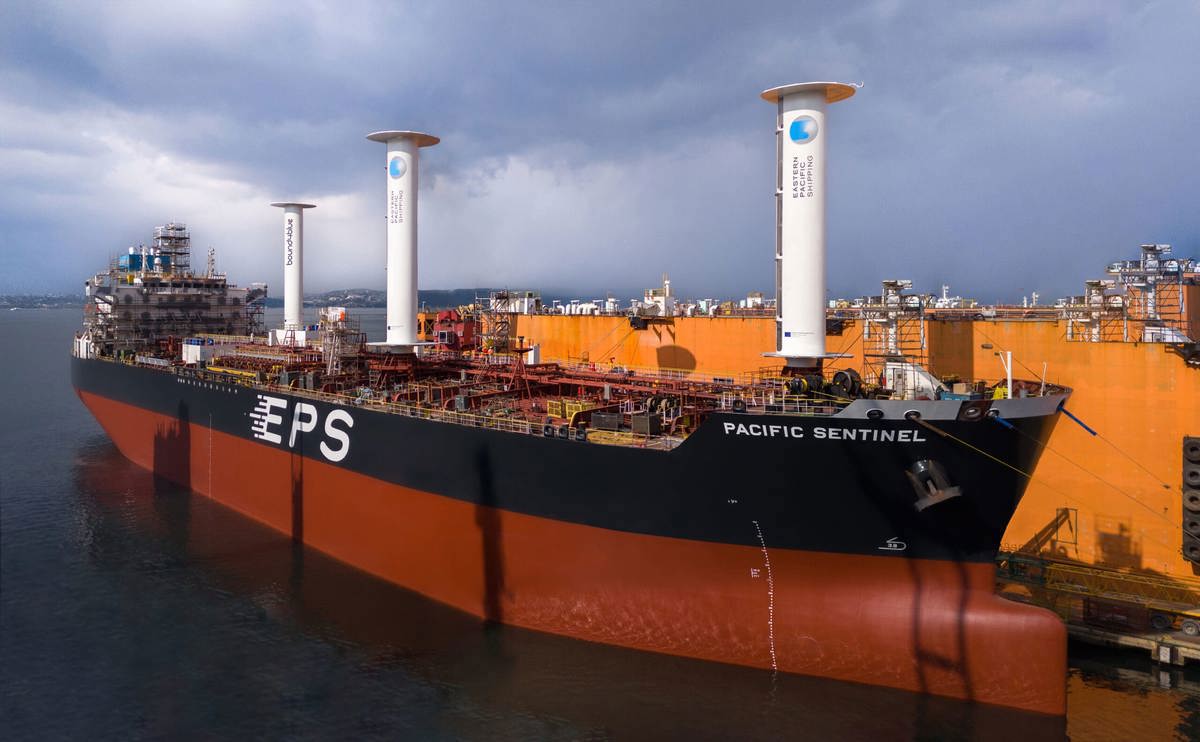Suction sails could cut fuel costs significantly – Seas At Risk
A new study by maritime non-governmental organisation Seas At Risk has highlighted the substantial economic and climate benefits of wind-assisted propulsion systems for global shipping.
 PHOTO: EPS' vessel Pacific Sentinel installed with Bound4blue's suction sails. bound4blue
PHOTO: EPS' vessel Pacific Sentinel installed with Bound4blue's suction sails. bound4blue
Wind-assisted propulsion systems (WAPS), like suction sails, are gaining popularity among shipowners seeking technologies to enhance vessel performance and reduce fuel consumption. When installed on ships, WAPS are expected to lower CO2 and other greenhouse gas (GHG) emissions.
Seas At Risk considers three roundtrip routes in its study: Rotterdam-Santos, Accra-Shanghai and Mombasa-Shanghai. Three vessel types are included: a 50,000 dwt medium range tanker, an 80,000 dwt bulk carrier and a 125,000 dwt container ship.
The study shows that retrofitting large bulk carriers with 2-4 suction sails can “deliver energy savings of up to two to twelve percent.”
From an economic perspective, a bulk carrier retrofitted with four suction sails can save over $105,000 on an average roundtrip from Accra to Shanghai, the study finds. That adds up to nearly $500,000/year in fuel costs savings per vessel, the nonprofit claims.
Its key findings reveal that vessels equipped with suction sails achieve higher fuel savings, along with improved financial and regulatory returns.
Call for robust climate policies
As the International Maritime Organization (IMO) gears up for its 7-11 April to set mid-term measures to reach its 2023 GHG Strategy, Seas At Risk calls on governments to ensure climate ambition across the IMO policies, with primary focus on wind power.
The nonprofit highlights three key areas of focus:
- Carbon levy: The IMO’s 176 member states need to adopt a levy of at least $150/CO2-equivalent, with equitable revenue distribution and dedicated funding for WAPS adoption
- Energy efficiency: Members must align the existing Carbon Intensity Indicator (CII) with the IMO’s 2023 GHG strategy goals to drive emission reductions
- Fuels standard – Governments should reward the use of wind-assisted technologies under the Global Fuels Standard (GFS) to incentivise their uptake
“The upcoming IMO discussions are pivotal in shipping’s decarbonisation transition and wind must be central to the solution,” Sian Prior, shipping policy director at Seas At Risk said.
“It is a proven, readily available and cost-effective technology that can help the global fleet meet the IMO’s 2030 energy targets,” she added.
By Aparupa Mazumder
Please get in touch with comments or additional info to news@engine.online





